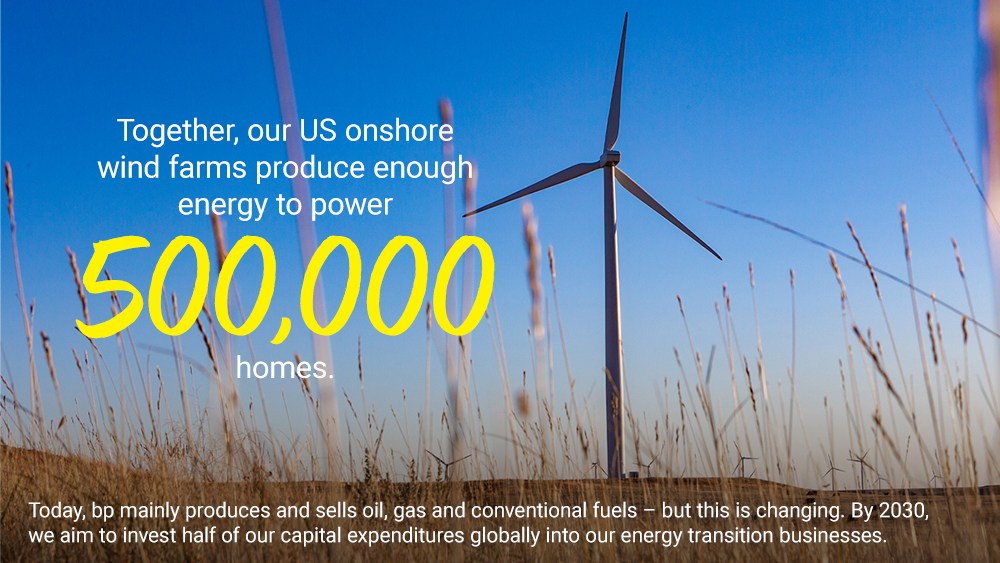| | | | | | | Presented By bp | | | | Axios Generate | | By Ben Geman and Andrew Freedman · Feb 02, 2023 | | 🧭 The needle is pointing toward the weekend. But not yet. Today's newsletter has a Smart Brevity count of 1,260 words, 5 minutes. 🔮 Axios is hosting our 2nd annual What's Next Summit on March 29 in Washington, D.C. spotlighting the innovations and people that are breaking boundaries and shaping our world. Request an invite 🎶 Today marks 35 years since the late Leonard Cohen released the album "I'm Your Man," which provides today's intro tune... | | | | | | 1 big thing: The House GOP's energy agenda is about supply chains |  | | | Illustration: Sarah Grillo/Axios | | | | House Republicans' energy agenda centers around highlighting an uncomfortable truth: Without significant changes to the world order, the energy transition could make the U.S. more vulnerable, Axios Pro Energy Policy's Jael Holzman reports. Why it matters: This is the key to understanding the GOP energy plan for this Congress. It's not focused on swift climate action, like the Democratic agenda, but on ensuring national security. The big picture: The GOP will focus on how a pivot away from fossil fuels could create fresh national security risks — and a less-secure supply chain — if the nation remains reliant on China. - China is a world leader in mining and manufacturing materials for batteries, solar panels and other low-carbon tech products sought after for a successful energy transition.
- President Biden and congressional Democrats talk up energy security, too, but use that rationale to argue for aggressive investments in climate action (see: the Inflation Reduction Act).
What's next: From their legislative priorities to their oversight agenda, Republicans are putting forward an all-of-the-above energy strategy that prioritizes national security while leaving room for fossil fuels and renewables. Between the lines: Some of the GOP policy proposals on energy security would have potential climate side benefits, like on permits and support for mining. - "Where Republicans and Democrats are coming together, even if they're using different language on it and goals in total, [is that] there's a need to at least shore up American energy security," said Drew Bond, president of the right-aligned climate group C3 Solutions.
What we're watching: Whether the House GOP's energy defense focus can help their proposals land with moderate Democrats like Joe Manchin and recent independent Kyrsten Sinema. A more detailed version of this story was published Wednesday as a special preview edition of Axios Pro Energy, launching Feb. 13. Subscribe today by using code POLICYLAUNCH at checkout to get $200 off your subscription. |     | | | | | | 2. Exclusive: Climate-fueled food threat for tribal nations |  | | | Photo illustration: Shoshana Gordon/Axios. Photos: Salwan Georges/The Washington Post, Bernard Friel/UCG/Universal Images Group, Michael Macor/The San Francisco Chronicle via Getty Images | | | | Increasingly hungry tribal nations are facing an uncertain future, as expanded food assistance benefits are about to run out and it's not clear whether they'll find a stable funding source for future aid, Axios' Ayurella Horn-Muller reports. The big picture: Anti-hunger activists warn that this month's expiration of increased SNAP benefits will hurt food-insecure populations — and temporary federal pilot programs aren't guaranteed to fill the funding gaps. What they're saying: Heather Dawn Thompson, director of the USDA's Office of Tribal Relations, tells Axios in an exclusive interview that without food assistance pilot programs that empower local and regional food systems, "we are in trouble." The backstory: In the U.S., nearly half of Native Americans and Alaskan Natives are thought to be food-insecure, per a 2022 study. - "[Food insecurity] is very much exacerbated in Indian Country where most of our reservations are very rural and isolated, and are food deserts," Thompson, a member of the Cheyenne River Sioux Tribe, tells Axios.
Context: From marine heatwaves decimating species of salmon in the Yukon River to the decline of Alaskan snow crabs, climate change is contributing to the loss of traditional food sources. - Coastal tribal nations in particular are experiencing dramatic climate-fueled impacts to their food sources.
- "They are the canary, if you will, in the coal mine," Thompson says.
Read the whole story |     | | | | | | 3. Senior Kerry aide heads to renewables giant |  | | | Photo illustration: Shoshana Gordon/Axios. Photo: Courtesy of Varun Sivaram | | | | First in Generate: Varun Sivaram just left his role as a top adviser to U.S. climate envoy John Kerry to join multinational renewables powerhouse Ørsted, Ben writes. - He's now Ørsted's group senior VP for strategy and innovation.
Why it matters: It's a newly created role and function at Ørsted, a top player in offshore wind, signaling expanded efforts across technologies like solar and green hydrogen. - He will "lead the development and deployment of transformative technologies and digital innovations," per Ørsted.
The big picture: Sivaram joined the administration at the outset and spearheaded several initiatives under Kerry. - A key one: The First Movers Coalition, under which corporate giants are making billions of dollars in purchase commitments for tech to decarbonize heavy industries like cement, shipping and steel.
- It now counts over 70 companies like Apple, BHP, GM, and other heavyweights aiming to create a "market pull" to speed tech deployment (we covered the 2021 launch).
Catch up fast: Sivaram wrote a 2018 book on solar power and has held positions with the Council on Foreign Relations, Columbia University and ReNew Power. What they're saying: "Varun brings proven expertise in the next generation of clean technologies, as well as the strategic and regulatory landscape in which the clean energy industry operates," Ørsted CEO Mads Nipper said in a statement. |     | | | | | | A message from bp | | bp is one of America's leading energy investors | | |  | | | | bp is working to deliver the energy America needs today while developing lower carbon alternatives. We've invested $130 billion+ in America since 2005. See how we are advocating for good policy to help us go further, faster. | | | | | | 4.🛢️Catch up fast on oil: Shell and Biden | | 💰Shell this morning reported a record $40 billion 2022 annual profit and announced another $4 billion worth of share buybacks in this year's first few months, Ben writes. - Why it matters: It's the latest sign of how high commodity prices brought huge earnings for oil majors on both sides of the Atlantic.
- What we're watching: Shell's haul alongside other companies' earnings are "certain to intensify pressure on governments to further raise taxes on the sector," Reuters notes.
⚠️ Speaking of Shell, the NGO Global Witness filed a complaint with the Securities and Exchange Commission alleging the oil giant is misleading investors. - Driving the news: It alleges Shell's presentation of its investments greenwashes by lumping together gas and renewables, obscuring how much it's really devoting to zero-carbon energy. Shell disputes the allegations.
➡️ The Interior Department moved closer to approving ConocoPhillips' big Willow oil project in Alaska's North Slope, drawing strong pushback from environmental groups over concerns about climate change and the region's sensitive ecosystems. - Driving the news: The agency listed a scaled-back version of the company's plan as the "preferred alternative" in a key environmental analysis of the North Slope project released Wednesday.
- The intrigue: The project is a Rorschach test on climate. Interior's study finds the roughly 600 million barrels of oil Willow would produce over 30 years would have an extremely small effect on global emissions (the world uses almost 100 million barrels per day). But it comes as emissions must be falling quickly and fossil fuel reliance must decline to keep global climate goals from slipping away.
- Go deeper: Full Interior project analysis... Washington Post coverage
|     | | | | | | 5. Where lightning struck in 2022 |  Data: Chris Vagasky/Vaisala, National Lightning Safety Council; Map: Erin Davis/Axios Visuals Last year may have been a relatively average lightning year based on the total number of strikes across the U.S., according to data from Vaisala, which operates a global lightning detection network, Andrew writes. - However, the pattern of strikes was unusual.
Why it matters: Shifts in lightning hot spots can provide clues to major storm events and how storm corridors are changing over time. Context: In a warming world, the total amount of lightning is expected to increase. Between the lines: In 2022, Florida took the top prize for the most lightning flashes, while the Southeast overall saw quite a bit of activity. |     | | | | | | Bonus: Where lightning activity defied the norm |  Data: Chris Vagasky/Vaisala, National Lightning Safety Council; Map: Erin Davis/Axios Visuals Last year saw an uptick in lightning compared to the average across the Southwest, which reflects an active monsoon season. Strikes across the country's northern tier were also plentiful, revealing the prevailing storm track. Of note: During the Buffalo blizzard in December, about 180 lightning strikes occurred in the vicinity of a wind farm downwind of Lake Erie, said Chris Vagasky, a Vaisala meteorologist. |     | | | | | | A message from bp | | bp is one of America's leading energy investors | | |  | | | | We're one of America's leading energy investors and every major bp global business is active here, including our wind businesses. We operate 9 onshore wind assets in 6 states and are developing massive offshore wind projects with Equinor. See how we are advocating for good policy to help us go further, faster. | | | | 📬 Did a friend send you this newsletter? Welcome, please sign up. 🙏 Thanks to Nick Aspinwall and David Nather for edits to today's newsletter. |  | | Your personal policy analyst is here. | | | | | | Axios thanks our partners for supporting our newsletters.
Sponsorship has no influence on editorial content. Axios, 3100 Clarendon Blvd, Arlington VA 22201 | | | You received this email because you signed up for newsletters from Axios.
To stop receiving this newsletter, unsubscribe or manage your email preferences. | | | Was this email forwarded to you?
Sign up now to get Axios in your inbox. | | | | Follow Axios on social media:    | | | | | |










No comments:
Post a Comment